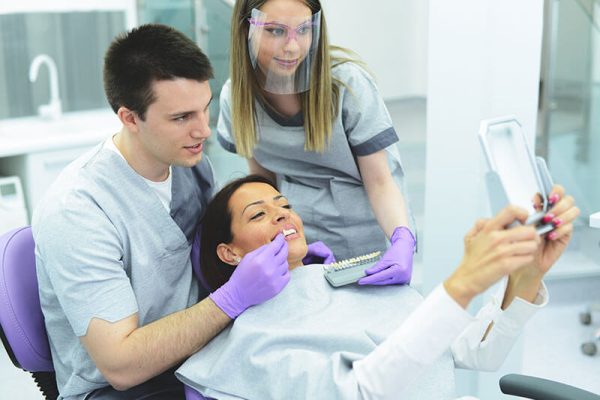Reclaim Your Beautiful Smile and Oral Health
When you think about dental hygiene, regular brushing, flossing, and biannual checkups probably come to mind. But sometimes, despite our best efforts, a deeper level of cleaning is needed to maintain optimal oral health. This is where gross debridement cleaning comes in.
What Is a Gross Debridement Cleaning?
Gross debridement cleaning is a comprehensive dental cleaning procedure that goes beyond standard cleanings. It involves the removal of plaque and tartar from above and below the gum line, including hard-to-reach areas, to prevent the buildup of bacteria and the development of gum disease.
A local anesthetic may be administered during the cleaning, especially if the patient has sensitive gums or if a substantial amount of plaque and tartar needs to be removed. Gross debridement cleanings may also require multiple appointments.

The Benefits of Gross Debridement Cleanings
There are several benefits to gross debridement cleanings, including:
- Removes plaque and tartar buildup above and below the gum line
- Helps prevent gum disease and tooth decay
- Promotes healthy gums and teeth
- Reduces inflammation
- Prevents infection and promotes healing
- Can improve overall oral health and hygiene
- Helps maintain a bright and healthy smile
When Gross Debridement Cleaning Is Necessary
Gross debridement cleaning is typically recommended when there’s excessive plaque and tartar buildup that hasn’t been addressed through regular cleanings or neglected oral hygiene routines. This can lead to gum disease, tooth decay, and other oral health issues.
Your dentist may recommend a gross debridement cleaning if you have:
- Excessive plaque and tartar buildup on the teeth
- Bleeding gums when brushing or flossing
- Persistent bad breath or a bad taste in the mouth
- Swollen or tender gums
- Loose teeth or changes in the way your teeth fit together when you bite
- Receding gums or teeth that appear longer than normal
- Pus or other signs of infection around the teeth or gums
How the Gross Debridement Cleaning Process Works
Gross debridement cleaning involves several steps to ensure thorough cleaning of your teeth and gums. The process typically takes between one to four hours to complete and involves the following steps:
- Evaluation: The first step in the gross debridement cleaning process is an evaluation of your oral health. This will typically include x-rays and an examination of your teeth and gums.
- Scaling: The next step is scaling, which involves the removal of plaque and tartar buildup above and below the gum line using specialized tools.
- Root Planing: Once scaling is complete, your hygienist will move on to root planing, which involves smoothing out the roots of your teeth to prevent further plaque buildup.
- Antibacterial Rinse: After scaling and root planing, the dental hygienist will use an antibacterial rinse to remove any remaining bacteria and promote healing.
The process can be uncomfortable for some patients, but your dentist will use a local anesthetic to numb the area and make the procedure more comfortable.
Caring for Your Teeth After a Gross Debridement Cleaning Procedure
After the gross debridement cleaning procedure, follow your dentist’s instructions for maintaining proper oral hygiene:
- Brush your teeth properly: Brush your teeth at least twice a day using a soft-bristled toothbrush and fluoride toothpaste. Make sure to brush all tooth surfaces, including the outer, inner, and chewing surfaces. Use gentle, circular motions, and take your time to thoroughly clean your teeth.
- Floss daily: Regular flossing is crucial for removing plaque and food particles from between your teeth and along the gumline. Gently slide the floss between each tooth and curve it around the base of each tooth, making sure to go beneath the gum line.
- Use mouthwash: Rinse your mouth with an antimicrobial mouthwash after brushing and flossing. This can help reduce bacteria and freshen your breath. Choose a mouthwash that’s alcohol-free and specifically formulated for gum health.
- Follow a balanced diet: A nutritious diet can contribute to overall oral health. Limit sugary and acidic foods and drinks, as they can increase the risk of tooth decay and gum problems. Instead, focus on consuming plenty of fruits, vegetables, lean proteins, and dairy products.
- Quit smoking: Smoking and using tobacco products can severely impact oral health and increase the risk of gum disease. If you smoke, consider quitting to promote healing and maintain healthy gums.
- Attend regular dental checkups: Schedule routine dental visits every six months or as recommended by your dentist. Regular visits allow Dr. Dawson to monitor your oral health, provide preventive care, and address any emerging issues promptly.

Frequently Asked Questions
The gross debridement cleaning procedure itself isn’t typically painful since your dentist will numb the area with a local anesthetic. You may experience discomfort or sensitivity during and after the procedure, such as soreness or tenderness in the gums. This discomfort should subside within a few days after the procedure. If you experience any severe pain or bleeding after the procedure, contact your dentist right away.
The length of time for a gross debridement cleaning procedure can vary depending on the extent of the cleaning needed and the individual patient’s oral health. Generally, the procedure can take anywhere from 30 minutes to an hour or more. Your dentist can give you a more accurate estimate based on your specific needs.
It’s possible to receive dental sedation during a gross debridement cleaning procedure, depending on the individual patient’s needs and preferences. Your dentist can discuss your sedation options and determine the best approach to ensure your comfort during the procedure. It’s important to let your dentist know if you have any concerns or anxiety about the procedure, as they can work with you to create a comfortable and stress-free environment for your dental visit.
Yes, you can eat after a gross debridement cleaning procedure. However, it’s important to wait until any numbness from the procedure has worn off before consuming any hot liquids or solid foods, as you may accidentally burn yourself. Additionally, it’s best to avoid hard, sticky, or crunchy foods that may irritate your gums or teeth for the first few days after the procedure. Your dentist can provide specific instructions on what foods to avoid and how to care for your teeth and gums after the procedure.
